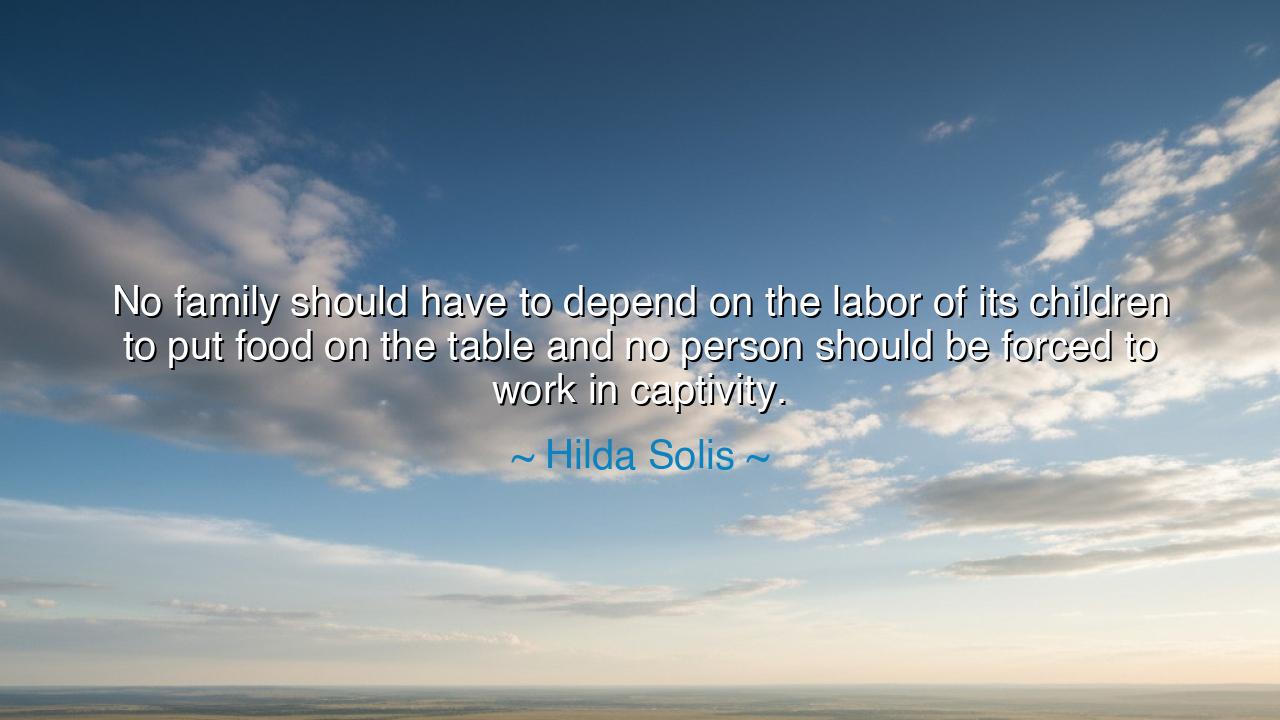
No family should have to depend on the labor of its children to
No family should have to depend on the labor of its children to put food on the table and no person should be forced to work in captivity.






Host: The dusk had settled over the café, casting a soft, golden glow on the tables. The world outside seemed distant, muted by the steady rhythm of rain against the window. Inside, the air was warm, carrying the familiar scent of coffee and baked goods. Jack and Jeeny sat together, the weight of their conversation hanging in the air like a quiet tension. The café’s soft hum was a background to their words, each one carefully considered.
Jeeny, her fingers gently tracing the rim of her cup, broke the silence with a quiet thought.
Jeeny: “I came across a quote today by Hilda Solis. She said, ‘No family should have to depend on the labor of its children to put food on the table and no person should be forced to work in captivity.’ It made me think about the way we view work and exploitation. What do you think?”
Jack: He raised an eyebrow, a hint of skepticism in his voice. “It sounds like she’s pointing out a real issue—child labor, exploitation—but doesn’t that quote oversimplify things? The world isn’t black and white. Sometimes, families depend on their children to survive, whether we like it or not. There’s a lot of complexity in how people live, how they make ends meet.”
Host: The rain outside softened into a steady hum, almost melodic against the window as Jeeny’s gaze remained steady, her voice calm but insistent.
Jeeny: “I agree, Jack. The reality is complicated, but I think Hilda Solis is speaking to a deeper truth. No child should ever have to shoulder the burden of a family’s survival. Work—especially forced labor or child labor—shouldn’t come at the cost of a child’s education, their well-being, or their future. People—children, especially—deserve a chance to thrive, to grow, without being trapped in a cycle of survival.”
Jack: He leaned back slightly, the weight of her words settling in. “But how do we stop it? Systems are in place, and not everyone has the opportunity to walk away from the struggle. It’s easy to say ‘no one should be forced to work in captivity,’ but the reality is that many people are forced into those situations because they have no choice.”
Host: The rhythm of their conversation seemed to match the subtle beat of the rain, each word thoughtfully exchanged. Jeeny’s voice was gentle but carried an undercurrent of something more. She wasn’t just agreeing with Jack, but challenging him to see the bigger picture.
Jeeny: “I think that’s the problem, Jack. Too many people are stuck in that cycle, forced to work just to survive, and it feels like the system is built to keep them there. But what if we could change the system? What if we created a world where children could be children—where they don’t have to trade their dreams for survival? It’s about recognizing that every person, every child, has the right to live without oppression, without being forced into work that steals their freedom.”
Jack: “But changing that system... it’s not something that happens overnight. It’s a whole shift in how we value labor, in how we treat people. And it’s hard to even know where to begin.”
Jeeny: “It starts with recognizing the problem, Jack. It starts with valuing people—not just for the work they can do, but for who they are. It’s about demanding that no one is exploited, that everyone has the chance to live with dignity. The first step is making sure no child has to give up their childhood to help support a family.”
Host: The mood in the café had deepened, the conversation unfolding in layers, each word carrying more weight than the last. Jack’s usual skepticism seemed quieter now, as though he was starting to see the layers of complexity Jeeny was pointing out. The world outside had faded into the background, leaving only the two of them, sitting in the quiet space of reflection.
Jack: “I get it. I guess I’ve been so focused on the practicalities—on how tough things can be for some families—that I’ve overlooked the bigger picture. It’s not just about surviving, it’s about living. It’s about giving people the freedom to live without being forced into captivity, whether that’s physical, emotional, or even societal.”
Jeeny: “Exactly. Survival shouldn’t come at the cost of human dignity. And when we start to recognize that, we can begin to make changes. True freedom comes when everyone has the opportunity to grow, to thrive, without being tied down by circumstances that limit them.”
Host: The rain outside had faded, leaving a quiet stillness in its wake. Jack and Jeeny sat, the weight of their conversation hanging between them, a shared understanding that the fight for freedom, for dignity, and for the right to live without oppression, started with a simple but profound shift: the recognition that every person—especially every child—deserved the opportunity to live fully, without the chains of forced labor.






AAdministratorAdministrator
Welcome, honored guests. Please leave a comment, we will respond soon